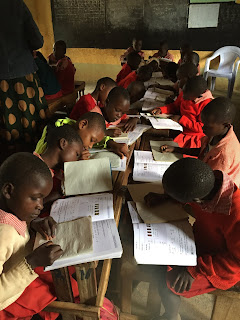TALKING
ABOUT CHILD EDUCATION WITH COMMUNITIES
During this month of August in Shianda, the
schools are closed for the holidays; I seize the opportunity to spend time with
the communities to speak about child education and issues.
How to discuss the education of children and
the problems encountered with these communities?
I decided to rely on 3 posters, as a basis for
my explanations and exchanges.
Parents are not the only actors in the child’s
development, they are surrounded by the extended family, but also by the
community, institutions and society in general.
Parents are obviously responsible for their
child and must be vigilant to ensure that the child's environment is safe and
caring.
This poster allowed for a lot of discussion
about the potential risks in the community and the institutions (bad
associations, road risks, mistreatment at school ...). We thought about ways to
protect children and avoid these potential risks.
The second poster is based on the Convention on
the Rights of the Child with its main beneficiaries and main articles.
The fundamental rights of children are:
•The right to an
identity. Now in
Shianda, this is no longer a problem. According to communities, it is easy to
obtain a birth certificate necessary for all future steps concerning the child.
•The right to live and
good develop. This
consists of giving the child the food, water and necessary care. This right makes
members of groups wonder, they are often well aware of not having enough money
to feed their child 3 times a day. I accompanied my explanations of support for
the fact that they do their best for their child and that even if sometimes
life does not allow to be perfect, the important thing is to provide what we
can and of course to regularly monitor the health of his child, to react if
necessary.
•The right to
education. Bringing
their child to school is very important for members of these communities. They
are aware of the challenge of education for the future. We also exchange the
fact that the school, although essential, is not the only source of education
and for that we referred to the poster number 1.
•The right to be
protected and loved.
To define this right, we have of course mentioned the risks identified in the
poster number one and the responsibility of parents or guardians to provide
means of protection against these risks.
•The right to
participate. This
right brought a lot of discussion and questions from the participants. We
performed role plays to demonstrate that communication and explanations can
reassure children. It had to be explained that involving the child does not
mean giving up everything to him or waiting for his consent, the parent remains
the decision maker. But often, the child understands his environment better
when an adult take time to explain to him and this can reduce frustrations or
misunderstandings. Lack of time is an excuse not to talk with the child, but I
try to explain to them that starting by forcing a few minutes a day will be
very beneficial in intra-family relationships.
The third poster explains the development of
the child and the different areas of simultaneous development: physically,
intellectually, morally, socially and emotionally.
This third step in the exchanges allows a
return on everything that has been previously discussed and to identify the
various problems faced by parents or guardians.
The main concern that has been identified in
each group is the relationship with adolescents. It was very interesting to
discuss this period of childhood that is problematic everywhere in the world!
We had to talk about our own memories of our teenage times and what we had to
blame our parents for, or what we missed. I am surprised by the participation
to these exchanges because the members talk sincerely and bring elements of
understanding very useful to the group and also some solutions to test at home,
as to find the time to exchange with his child as a first step to creating a relationship
of trust. Games and mimes around emotions have been very useful to develop this
topic.
If time allowed, we could also, in some groups,
talk from case studies, related to the problems encountered here and so think
together about the risks and the possible solutions to avoid or overcome them.
These times of exchange are always very
studious but also very warm and punctuated by a shared meal, songs and prayers.


And then I must not forget that, who says
"I will come to speak with you about education", means for the
chairladies to invite the children to participate in the sessions.
It was always nice to take the time to play
with the children while waiting for the arrival of all participants and to see
them interested by listening to the exchanges between adults. This, in my
opinion, indirectly allowed a first new contact between children and adults,
around the needs of some and the attentions of others.
Thank you again for your warm welcome, your
constant attention and your sharing of experiences.
I will try to plan new sessions with these same
groups before my departure to discuss possible attempts to change and problems
encountered.




















